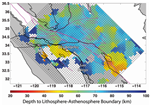A new research program funded by the National Institutes of Health will explore the role that a changing climate has on human health.

The geologic forces that shape the Earth's surface do their work in the lithosphere, often out of sight and far below the surface. Researchers have now measured the lithosphere’s thickness in southern California. It varies widely, from less than 25 miles to nearly 60 miles.
The U.S. Environmental Protection Agency (EPA) recently announced funding for Great Lakes Restoration Initiative projects in Northern Michigan totaling $1.1 million.
The Gulf Coast Ecosystem Restoration Task Force, chaired by U.S. Environmental Protection Agency (EPA) Administrator Lisa P. Jackson, recently released for public review and feedback its comprehensive preliminary strategy for long-term ecosystem restoration.
The U.S. Environmental Protection Agency announced today that it has approved new performance standards for controlling urban stormwater runoff in Washington, D.C.
New research shows how trees can improve air quality by filtering out pollution particulates, which are damaging to human health.
Constructing buildings, power plants and roads has driven a substantial increase in China's CO2 emission growth.
In a Q&A session with scientists from the Lawrence Berkeley National Laboratory, the team examines the carbon presence in soil in relation to climate change.

A new study has shown that encouraging strips of wild plants at the edges of fields is important for supporting bees and other important pollinators.
Research suggests soil environment determines humus depletion, which means the question as to how soils respond to global climate change needs to be readdressed.

A team from the University of Wisconsin believes they created a material that could be used to capture energy from respiration.
Soil and ground water underneath the site and adjacent properties are contaminated with arsenic, lead, polycyclic aromatic hydrocarbons and volatile organic compounds resulting from over 100 years of past industrial activities in the area. Exposure to these pollutants can have serious health effects, and in some cases, increase the risk of cancer.
Last month the extent of sea ice covering the Arctic Ocean declined to the second-lowest extent on record. Satellite data from NASA and the NASA-supported National Snow and Ice Data Center (NSIDC) at the University of Colorado in Boulder showed that the summertime sea ice cover narrowly avoided a new record low.
Siluria is the first and only company to develop an economically advantageous, methane-based alternative for producing fuels and chemicals normally derived from oil.
The network of electric-vehicle (EV) charging stations in Germany is still relatively sparse, but their number is growing rapidly. The majority of roadside charging points take the form of steel-clad pillars. A group of researchers has set out to develop an alternative design based on environmentally compatible materials.
It is unlikely the United States will meet some specific biofuel mandates under the current Renewable Fuel Standard by 2022 unless innovative technologies are developed or policies change.
An electric car designed and built by Brigham Young University (BYU) engineering students set a world land speed record for its weight class, averaging 155.8 mph over its two required qualifying runs, one of which was clocked at 175 mph.

Environmental responsibility doesn’t stop at the recycling bin. Now a day, even the wedding industry has more consumers opting for eco-friendly ceremonies down the aisle.
Researchers with the Sierra Nevada Research Institute (SNRI) at the University of California, Merced, have received a $2 million grant from the National Science Foundation to expand on a prototype system that uses a network of wireless sensors to track snowpack depth, water storage in soil, stream flow, and water use by vegetation in the Sierra — information that is key to efficient usage of such a scarce resource.
Changing human activities coupled with a dynamic environment over the past few centuries have caused fluctuating periods of decline and recovery of corals reefs in the Hawaiian Islands, according to a study sponsored in part by the Institute for Ocean Conservation Science at Stony Brook University.